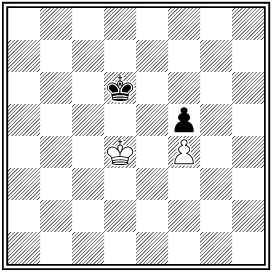FIDE just launched a chess tournament Kaggle event with $50,000 in prize money to the top five teams.
I haven't looked at the details much yet, but I thought some people here might be interested. It runs from now until early February.
https://www.kaggle.com/competitions/fid ... e/overview
FIDE & Google Efficient Chess AI Challenge
Moderator: Ras
-
Robert Pope
- Posts: 570
- Joined: Sat Mar 25, 2006 8:27 pm
- Location: USA
- Full name: Robert Pope
-
towforce

- Posts: 12826
- Joined: Thu Mar 09, 2006 12:57 am
- Location: Birmingham UK
- Full name: Graham Laight
Re: FIDE & Google Efficient Chess AI Challenge
Looks like a really good chess tournament - well done Google!
Summary of the rules:
* submit a program to run as an agent
* 64 Kb program
* 5 Mb RAM
* dedicated CPU with a single core
* 10s per move (each move - time not used is not carried forward)
Summary of the rules:
* submit a program to run as an agent
* 64 Kb program
* 5 Mb RAM
* dedicated CPU with a single core
* 10s per move (each move - time not used is not carried forward)
Human chess is partly about tactics and strategy, but mostly about memory
-
abulmo2
- Posts: 488
- Joined: Fri Dec 16, 2016 11:04 am
- Location: France
- Full name: Richard Delorme
Re: FIDE & Google Efficient Chess AI Challenge
I just gave a quick look.
As I understand, the chess "agent" should be written in python. Efficient and python sounds like an oxymoron to me.
As I understand, the chess "agent" should be written in python. Efficient and python sounds like an oxymoron to me.
Richard Delorme
-
towforce

- Posts: 12826
- Joined: Thu Mar 09, 2006 12:57 am
- Location: Birmingham UK
- Full name: Graham Laight
Re: FIDE & Google Efficient Chess AI Challenge
Are you sure about this? I cannot find any rules that say the agent must be written in Python. All I have seen is the the standard Kaggle Docker container includes some Python libraries: these would not actually be usable: if you attempted to import them, you'd break the 5 Mb memory limit - link.
In the golden era of the dedicated chess computer, 5 Mb would have been an absolute luxury (many had 1 Kb of RAM) - now it seems like starvation rations: even a watch has 2 Gb of RAM now (link)!
Human chess is partly about tactics and strategy, but mostly about memory
-
Vinvin
- Posts: 5316
- Joined: Thu Mar 09, 2006 9:40 am
- Full name: Vincent Lejeune
Re: FIDE & Google Efficient Chess AI Challenge
That remember me the first microcomputer using the hash tables from 1987 ( https://www.chessprogramming.org/Excel ) :
The Excel 68000 (12 MHz) with 16 KB of HT : https://www.schach-computer.info/wiki/i ... xcel_68000
and the Excel 68000 Mach II (12 MHz) with 128 KB of HT : https://www.schach-computer.info/wiki/i ... 00_Mach_II
The Excel 68000 (12 MHz) with 16 KB of HT : https://www.schach-computer.info/wiki/i ... xcel_68000
and the Excel 68000 Mach II (12 MHz) with 128 KB of HT : https://www.schach-computer.info/wiki/i ... 00_Mach_II
Information
Differences Mach II - Excel 68000
Basic equipment such as the Fidelity Excel 68000
Price was about one third higher than that of Fidelity Excel 68000
higher playing strength due to larger hash tables (128K)
in the middle game, the Mach II is approx. compared to Excel 68000. 20-60% faster
in final performances (King + farmers) the Mach II is approx. 3-6 times faster
in certain positions (see i.e. Diagram) is the Mach II approx. 200 times faster
-
hgm

- Posts: 28464
- Joined: Fri Mar 10, 2006 10:06 am
- Location: Amsterdam
- Full name: H G Muller
Re: FIDE & Google Efficient Chess AI Challenge
The one who designed this challenge obviously knows zilch about chess engines:
With 64KB program (In the binary?) and 5MB RAM it is an illusion that anything but the conventional alpha-beta engines with hand-crafted eval would stand any chance of winning this.This competition aims to shift the focus from brute-force computation to elegant and efficient design. Forget massive pre-computed tables and endless search trees – we're leveling the playing field and focusing on efficiency and strategic thinking.
You're challenged to devise innovative and efficient solutions to play chess against other agents, thereby further expanding the frontiers of AI research. Your exploration of novel, optimized techniques can address a growing complexity and scale of problems, like advancements in modeling and inference techniques and improvements upon traditional heuristic-based algorithms, beyond the realm of chess.
-
towforce

- Posts: 12826
- Joined: Thu Mar 09, 2006 12:57 am
- Location: Birmingham UK
- Full name: Graham Laight
Re: FIDE & Google Efficient Chess AI Challenge
hgm wrote: ↑Fri Nov 22, 2024 9:56 pm The one who designed this challenge obviously knows zilch about chess engines:
With 64KB program (In the binary?) and 5MB RAM it is an illusion that anything but the conventional alpha-beta engines with hand-crafted eval would stand any chance of winning this.This competition aims to shift the focus from brute-force computation to elegant and efficient design. Forget massive pre-computed tables and endless search trees – we're leveling the playing field and focusing on efficiency and strategic thinking.
You're challenged to devise innovative and efficient solutions to play chess against other agents, thereby further expanding the frontiers of AI research. Your exploration of novel, optimized techniques can address a growing complexity and scale of problems, like advancements in modeling and inference techniques and improvements upon traditional heuristic-based algorithms, beyond the realm of chess.
Human chess is partly about tactics and strategy, but mostly about memory
-
abulmo2
- Posts: 488
- Joined: Fri Dec 16, 2016 11:04 am
- Location: France
- Full name: Richard Delorme
Re: FIDE & Google Efficient Chess AI Challenge
For what I understand other languages are allowed but they need to be interfaced with a python file to communicate with the "kaggle environment". Many things are unclear to me. They use lawyers jargon everywhere and just give some (poorly written) code examples on how to proceed. I guess the usual UCI or xboard protocols are useless here.towforce wrote: ↑Thu Nov 21, 2024 5:25 pmAre you sure about this? I cannot find any rules that say the agent must be written in Python. All I have seen is the the standard Kaggle Docker container includes some Python libraries: these would not actually be usable: if you attempted to import them, you'd break the 5 Mb memory limit - link.
As I understand the 64kb limit is the size of the compressed source code (with the docker configuration files), not the executable. You have to use Docker to compile your code & execute it. Of course limiting the size of source code is an invitation to write obfuscated code without comments, without indentation, and with unreadable short names every where. That way I guess stokfish with hand crafted evaluation can easily fit the limitation.
The 5Mb limits does not count python size & "the kaggle environment". They are above them...
The rules are not very smart either. For example using a 10s + 0.1s simple delay per move is something unseen on computer chess.
Terrible !
Richard Delorme
-
mclane

- Posts: 18962
- Joined: Thu Mar 09, 2006 6:40 pm
- Location: US of Europe, germany
- Full name: Thorsten Czub
Re: FIDE & Google Efficient Chess AI Challenge
Looks very interesting.
In 64 kb you can do a lot.
At least kittinger, spracklens, schroeder, rathsmann, kaplan and martin bryant , frans morsch and others COULD do.
In 64 kb you can do a lot.
At least kittinger, spracklens, schroeder, rathsmann, kaplan and martin bryant , frans morsch and others COULD do.
What seems like a fairy tale today may be reality tomorrow.
Here we have a fairy tale of the day after tomorrow....
Here we have a fairy tale of the day after tomorrow....
-
hgm

- Posts: 28464
- Joined: Fri Mar 10, 2006 10:06 am
- Location: Amsterdam
- Full name: H G Muller
Re: FIDE & Google Efficient Chess AI Challenge
Well, as said above, it seems the limits are so generous that even Stockfish HCE could enter, after feeding the source to an uglifyer and compressing it. So it is really no contest.
